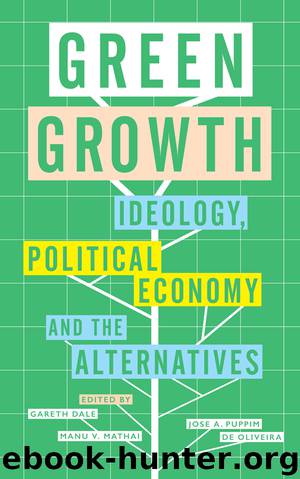Green Growth by Gareth Dale Manu V. Mathai Jose A. Puppim de Oliveira

Author:Gareth Dale,Manu V. Mathai,Jose A. Puppim de Oliveira
Language: eng
Format: epub
Publisher: Zed Books
Published: 2016-09-22T16:00:00+00:00
CHAPTER 8
Green jobs to promote sustainable development: creating a value chain of solid waste recycling in Brazil
Anne Posthuma and Paulo Sergio Muçouçah*
Introduction
The concept of ‘green growth’ involves a strong belief that scientific research, technological innovation and engineering solutions are capable of controlling the pace of environmental degradation, raising efficiency of natural resource usage and ensuring well-being while also raising productivity and economic growth.1 Yet, a key criticism of the green growth concept is that it is an insufficient policy guideline for achieving a sustainable future given the harsh realities of finite and unequally distributed resources, poverty and socio-economic exclusion that characterize so much of our current development paradigm.2 Green growth proponents include leaders of corporations, investors and policy-makers, but often the social dimensions of a more sustainable society receive inadequate attention, including how to ensure employment and income opportunities and paths for socio-economic inclusion, particularly for the poorest sections of society. In this way, the green growth concept risks leaving in place the existing structures of inequality and socio-economic exclusion that underpin and perpetuate the current unsustainable paradigm of production, consumption and distribution.3 In contrast, the ‘sustainable development’ framework seeks a more integrated approach, being founded upon three interlocking economic, environmental and social dimensions.4
Hence, when considering the economic and environmental components of sustainable development, it is equally important to take into account the role of social well-being that is attained through the promotion of stable and decent opportunities for employment and income generation. Within this perspective, the concept of green jobs5 emerged, which reinforces the promotion of quality job creation in environmentally sustainable sectors and activities, and contributes to the greening of existing enterprises and economies through the use of renewable energies, new technologies and materials, skills development and ensuring markets for sustainable products and services.6 It is important to highlight this recognition that the creation of decent work and incomes is not an automatic outcome of market mechanisms in the shift to a green economy.7 For this reason, a key task involves identification of good practices and their respective drivers, or policy instruments and institutions, which play a crucial role in ensuring the creation, remuneration, safety and other relative quality aspects of green jobs.8
The growth of recycling industries exemplifies how shifting economic perspectives and societal values can lead to the creation and growth of jobs linked to environmentally sustainable practices. The growth of recycling itself is based upon a recognition that waste has an economic value (i.e. it is less expensive to recycle, reprocess and reuse materials), an environmental value (i.e. the growth of waste recycling can result in less mining and deforestation, processing and consumption of raw resources), as well as a social value (i.e. waste recycling can generate green jobs and income-generating activities). Governments, particularly at the local level, have realized that recycling provides important public benefits, in addition to substantial cost savings.
In this context, the present chapter uses a value chain framework to examine the Brazilian experience in promoting solid waste recycling through a ‘bottom-up’ approach
Download
This site does not store any files on its server. We only index and link to content provided by other sites. Please contact the content providers to delete copyright contents if any and email us, we'll remove relevant links or contents immediately.
The Secret History by Donna Tartt(19003)
The Social Justice Warrior Handbook by Lisa De Pasquale(12177)
Thirteen Reasons Why by Jay Asher(8874)
This Is How You Lose Her by Junot Diaz(6857)
Weapons of Math Destruction by Cathy O'Neil(6249)
Zero to One by Peter Thiel(5768)
Beartown by Fredrik Backman(5719)
The Myth of the Strong Leader by Archie Brown(5482)
The Fire Next Time by James Baldwin(5409)
How Democracies Die by Steven Levitsky & Daniel Ziblatt(5200)
Promise Me, Dad by Joe Biden(5132)
Stone's Rules by Roger Stone(5066)
A Higher Loyalty: Truth, Lies, and Leadership by James Comey(4939)
100 Deadly Skills by Clint Emerson(4901)
Rise and Kill First by Ronen Bergman(4762)
Secrecy World by Jake Bernstein(4727)
The David Icke Guide to the Global Conspiracy (and how to end it) by David Icke(4686)
The Farm by Tom Rob Smith(4489)
The Doomsday Machine by Daniel Ellsberg(4474)
